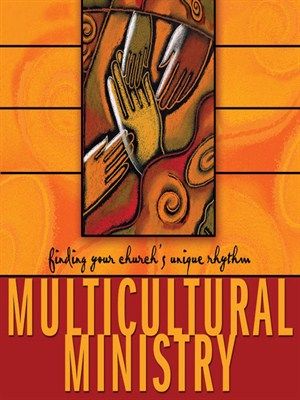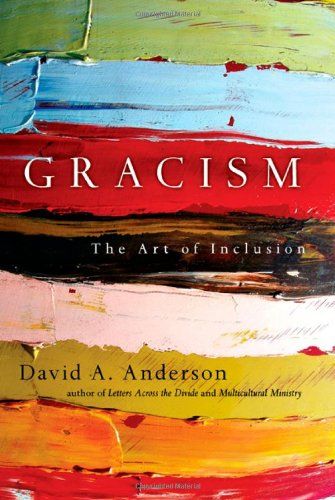 About a week ago I finished reading Multicultural Ministry: finding your church's unique rhythm by David A. Anderson, pastor of Bridgeway Community Church in Baltimore, and last Friday I finished digging into his Gracism: The Art of Inclusion. As I understand it, gracism, a word comprised of "racism" preceded by the letter "g" for God, encourages people to extend special favor to others based on their unique class, culture, ability or color and make that preference visible and apparent. In the preface the author writes [page 11]: "Gracism, unlike racism, doesn't focus on race for negative purposes such as discrimination. Gracism focuses on race for the purpose of positive ministry and service." However, race, gender and ethnicity form only a part of the gracism taxonomy, which also includes folks who are less educated, less physically or mentally able than some others, are lower income, less confident and/or posses anything else "different from."
About a week ago I finished reading Multicultural Ministry: finding your church's unique rhythm by David A. Anderson, pastor of Bridgeway Community Church in Baltimore, and last Friday I finished digging into his Gracism: The Art of Inclusion. As I understand it, gracism, a word comprised of "racism" preceded by the letter "g" for God, encourages people to extend special favor to others based on their unique class, culture, ability or color and make that preference visible and apparent. In the preface the author writes [page 11]: "Gracism, unlike racism, doesn't focus on race for negative purposes such as discrimination. Gracism focuses on race for the purpose of positive ministry and service." However, race, gender and ethnicity form only a part of the gracism taxonomy, which also includes folks who are less educated, less physically or mentally able than some others, are lower income, less confident and/or posses anything else "different from." 
On page 20 Pastor Anderson further explains, "The positive extension of favor toward certain people does not have to mean favoritism." And on page 23, "The one who hears, sees and pays attention to those on the margins—those in the desert—is a gracist." The liberation theology buzz-phrase of God's "preferential option for the poor" long ago made it into mainstream vocabulary; gracism is an expression of that type of preference. In what for me is an unexpected twist, Pastor David Anderson describes his church consciously configuring church staff, worship leadership, music group membership (and everything else) to appear visibly diverse rather than uniform.
Under the Grace-onomics(!) heading, Pastor David explains how a person can extend their connectional networks for the economic, professional or social benefit of others. On page 15 he refers to people "who may not be able to speak for themselves," adding, "And many times, even when they do speak, they are not heard." That's been my experience as I've attempted to reweave a peer network that would allow me to participate more fully than I've been able to as the result of my own efforts. I consider myself educated, articulate and expressive, but have been shut out too many times, thoughtlessly in some cases and probably intentionally in others.
An online friend who pastors somewhere east of the Mississippi wrote on one of our message boards:
I'm thinking about the temptation of Jesus story coming up this Sunday [Lent 1] and preaching about how this situation could tempt us to withdraw and pull into ourselves out of anger and fear but that the Gospel still calls us to move out of our comfort zones and give up both the anger and the fear of the "them."
My response to him included, "Excellent! I really like the direction you're taking with that text...Like everywhere, here we're encountering and potentially meeting lots of assorted 'others' and need to learn not to retreat into righteousness other than Christ's and need to learn to make safe places and space for those unlike us." (this may be old news?) I'm developing an adult series for some time around the day of Pentecost, partly based on Mark Nanos' The Irony of Galatians as I'm also making my way through the text of Galatians in preparation. I'm convinced my discovering this pair of books about gracism has been inspired and will influence our class discussions, especially since I'm going to circulate both books among class members.
Back to Galatians' author! After his encounter with the Risen Christ, Paul, a Jerusalem-educated Roman citizen born in the Jewish Diaspora, self-described as a "Hebrew of Hebrews," proclaimed and lived as if the birth, life, death and resurrection of Jesus Christ initiated a paradigm-shifting (I had to include that phrase!) cosmic transformation. Just as Saul/Paul insisted no longer would people be defined by ethnicity, race, outward appearance, gender or such particular semi-accidentals (but hey, folks, this was not exactly emancipation proclamation...) can we, the church of Jesus Christ in this community live by not defining people as Mexican or American, foreigner or native-born, green- or brown-eyed, straight or bi, military or civilian? Maybe in such an apparently gracist way so that our congregation and our community is visibly diverse and multi-everything? Can everyone be as equal to us as they are before God?
The brother-in-law of a friend described the truly astonishing degree of inclusiveness of a Roman Catholic congregation near his workplace: all ages, abilities, gender orientations, economic and educational levels, ethnic identities and cultural persuasions—a visible slice, a representation (maybe that needs to be "presentation") of the kingdom of heaven. But he added, "officially we're not welcome at *their* communion table, and our pastors can't preside, officially or not." So is that God's kind of diversity? Is it a true gracist community?
I'll conclude this blog with a couple of my own experiences. The first happened last spring at Old Condo Shadows. I'd offered to present the fruit of one of my talents as part of the program for the monthly Friday evening potluck, so they took me up on it, and in addition scheduled a photographer who'd been in that group forever and a quilter who'd moved into this neighborhood more recently. I presented a DVD portfolio of about 60 or 70 pieces of my graphic art. My blog readers know my art has a lot of energy and color, but very little of it is obscure or "hard to get." After my show I got only one compliment, from the guy who was interim pastor at the time. As usual, I made a string of excuses: the resolution on the TV wasn't exactly great (it really wasn't); Pastor Scott and I are a year and a half apart, meaning we inhabit the same world and share the same culture. As an aside, despite my persistent complaints of lack of shared history in my current life, another person who has been through the same cultural, political and social times, even if not directly alongside me, makes a very good stand-in for someone who has been there with me.
A week later a member of that dinner group posted pics he'd taken of the evening of the others' artistic presentations, but there were none of me! Truly, not for a split second do I believe he intentionally excluded me from his documentation of the evening, but a Gracist approach would have thought of me and decided to take a few pics, even if he didn't like, or get, or understand my art or considered me weird or unusual.
Then, I'll reference the time I was intermittent (approximately monthly) pianist and choir accompanist for a Tongan United Methodist congregation. In many ways it was an ethnic church, but despite a sizable Tongan community in that city, still they lived as strangers, with customs, spoken language, native dress and food very different from the majority mostly USA-born, culturally western-USA/Western-hemisphere populations. Yes, I had something to offer them they needed and wanted, but they constantly showed me hospitality as they invited me to holiday parties and events, always gave me food to take home after Sunday church (we'd have morning worship followed by a huge meal and then return to the church sanctuary for a testimony meeting). Although they worshiped in Tongan, the pastor would read the scripture passage he was preaching on in English—although I had little clue as to his interpretation, at least I knew the text!
So how do we start gracist living in our communities and in our churches? How can we bring others into our center and also receive their gifts of hospitality when they choose to invite us closer to their centers rather than leaving us on the margins of their worlds? We need to begin prayerfully risking to live out God's answers to those questions as we become Gracists and enable others to live Gracefully, as well!
my amazon review: noticing and celebrating differences

I am so glad I dropped by to read this, there is so much to chew on here I beleive it needs a second or third reading before I attempt to comment! :-)
ReplyDelete